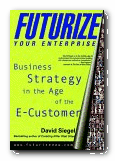radical advice on customer-centred business methods
David Siegel is a Web design guru who made his name with the best-selling Creating Killer Web Sites. That was a manifesto on graphic presentation: this is his thesis on business strategy and e-Commerce. The message is quite uncompromising – you must pay attention to what your customers want, or be prepared for extinction. He’s a great believer that total de-regulation and the freedom for anybody to trade on line will allow the best ideas and services to prevail. He argues that commercial success in the online world comes from giving things away, letting go of control, networking, and above all in giving customers exactly what they ask for.
 At times he becomes slightly Utopian, arguing that Truth will out, and the Little Man will prevail, but he has very direct, practical advice for those who want to seriously participate in the new e-Commerce. For instance, he suggests that you ditch voice mail:
At times he becomes slightly Utopian, arguing that Truth will out, and the Little Man will prevail, but he has very direct, practical advice for those who want to seriously participate in the new e-Commerce. For instance, he suggests that you ditch voice mail:
It’s slow, retrieval is cumbersome, it can’t be skimmed, it’s almost impossible to annotate, it doesn’t take attachments, it can’t be archived easily, and it doesn’t tie into any other kind of system. Voice mail may be useful for some things, but switching to e-mail will pay off quickly.
He takes what sometimes seems like a New Age approach in expecting business executives to become altruists, to empower their employees, and even to give away time, effort, and information. Yet there does seem to be some logic to all this in the odd new world of e-commerce. It’s also good that he draws his illustrative examples from a wide variety of businesses.
His advice is aimed at big businesses, but the underlying principles will be equally applicable to small start-ups or individual entrepreneurs. It will be of most use to those people who realise that the Internet offers a new way of doing business, but can’t quite see how it could be realised.
He also throws out plenty of practical tips – such as the suggestion that most web sites could be improved by the use of plain English. This is because “most companies communicate using the passive rather than the active voice … and copywriters sanitize their corporate communications until they become meaningless … most web sites are full of jargon”
The latter part of the book contains eight business case studies – companies selling health foods, magazines, steel, real estate, books, and such. He analyses where they are going wrong in their web strategies; how they should make closer contact with their customers; and how they can change their behaviour to survive in the New Age. Unfortunately, these are all hypothetical companies, so his arguments are seriously weakened. With Siegel’s resources, he could surely have given real case studies, which would have been infinitely more convincing to his case.
So, like his killer web sites book, this one is full of thought-provoking ideas expressed in an energetic and ‘committed’ style. There’s quite a lot of generalization and wish-fulfilment too – but on the whole anyone who is interested in e-commerce and web-based business will profit from considering what he has to offer.
© Roy Johnson 2003
David Siegel, Futurize your Enterprise: Business Strategy in the Age of the e-Customer, London/New York, John Wiley, 2003, pp.318, ISBN: 0471357634
More on eCommerce
More on media
More on publishing
More on technology